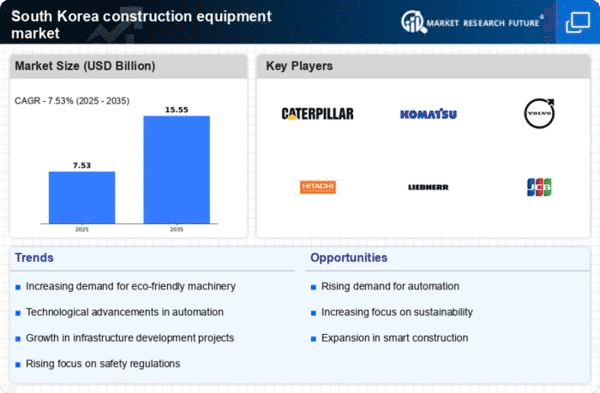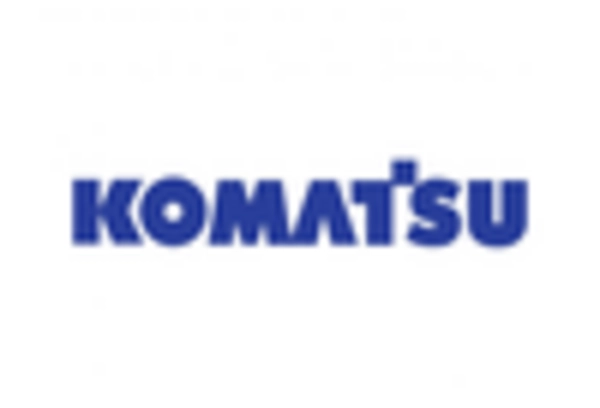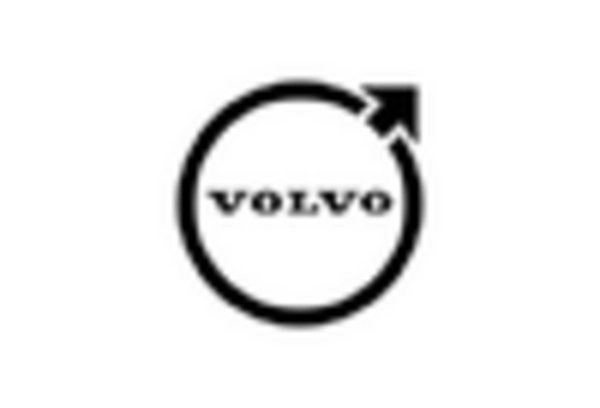Rising Urbanization Trends
Urbanization in South Korea is accelerating, with projections indicating that over 80% of the population will reside in urban areas by 2030. This trend is significantly impacting the construction equipment market, as the demand for residential and commercial buildings increases. The construction sector is expected to grow at a CAGR of around 5% over the next five years, driven by the need for housing and infrastructure in urban centers. As cities expand, construction companies are likely to invest in more efficient and technologically advanced equipment to meet the growing demands. This shift not only enhances productivity but also aligns with the evolving preferences of urban dwellers for modern living spaces. Thus, the rising urbanization trends are poised to be a key driver for the construction equipment market.
Government Regulations and Standards
the construction equipment market in South Korea influences stringent government regulations and safety standards.. The Ministry of Land, Infrastructure and Transport has implemented various regulations aimed at ensuring safety and environmental sustainability in construction practices. Compliance with these regulations often necessitates the adoption of advanced machinery that meets specific safety and efficiency criteria. As a result, construction companies are increasingly investing in modern equipment that adheres to these standards, thereby driving growth in the market. Additionally, the push for eco-friendly construction practices may lead to a rise in demand for equipment that minimizes environmental impact, further shaping the landscape of the construction equipment market.
Infrastructure Development Initiatives
The construction equipment market in South Korea is currently experiencing a surge due to extensive infrastructure development initiatives. The government has allocated substantial budgets for projects such as highways, bridges, and urban transit systems, which are expected to reach approximately $30 billion by 2026. This investment is likely to drive demand for various construction equipment, including excavators, cranes, and bulldozers. As urbanization continues to rise, the need for modernized infrastructure becomes increasingly critical. Consequently, construction companies are compelled to upgrade their equipment fleets to meet project demands, thereby stimulating growth in the construction equipment market. Furthermore, the emphasis on high-quality construction standards necessitates the use of advanced machinery, which could further enhance market dynamics.
Technological Integration in Construction
The integration of technology in construction processes is transforming the construction equipment market in South Korea. Innovations such as telematics, automation, and artificial intelligence are enhancing operational efficiency and safety on construction sites. For instance, the use of telematics allows for real-time monitoring of equipment performance, which can lead to reduced downtime and maintenance costs. As construction companies increasingly adopt these technologies, the demand for advanced equipment that incorporates such features is likely to rise. This trend not only improves productivity but also aligns with the industry's shift towards more data-driven decision-making. Consequently, technological integration is expected to be a significant driver for the construction equipment market.
Increased Investment in Renewable Energy Projects
the construction equipment market in South Korea witnesses growth due to increased investment in renewable energy projects.. The government has set ambitious targets for renewable energy generation, aiming for 20% of total energy consumption to come from renewable sources by 2030. This shift necessitates the construction of solar farms, wind turbines, and other renewable energy infrastructures, which in turn drives demand for specialized construction equipment. Companies involved in these projects are likely to invest in advanced machinery to ensure efficiency and compliance with environmental standards. As the focus on sustainable energy solutions intensifies, the construction equipment market is expected to benefit from this trend, potentially leading to a more diverse range of equipment offerings.
















